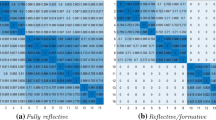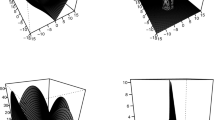Abstract
The principal component analysis (PCA) is one of the most celebrated methods in analysing multivariate data. An effort of extending PCA is projection pursuit (PP), a more general class of dimension-reduction techniques. However, the application of this extended procedure is often hampered by its complexity in computation and by lack of some appropriate theory. In this paper, by use of the empirical processes we established a large sample theory for the robust PP estimators of the principal components and dispersion matrix.
Similar content being viewed by others
References
P. J. Huber, Projection pursuit (with discussions), Ann. Statist., 1985, 13: 435–525.
F. De la Torre and M. J. Black, Robust principal component analysis for computer vision, in the 8th International Conference on Computer Vision, Vancouver, Canada, 2001, I: 362–349.
S. J. Devlin, R. Gnanadesiken, and J. R. Kettenring, Robust estimation and outlier detection with correlation coefficients, Biometrika, 1975, 62: 531–545.
R. Gnanadesiken and J. R. Kettenring, Robust estimates, residuals and outlier detection with multiresponse data, Biometrics, 1972, 28: 81–124.
C. Croux and G. Haesbroeck, Principal component analysis based on robust estimators of the covariance or correlation matrix: Influence functions and efficiencies, Biometrika, 2000, 87: 603–618.
G. Li and Z. Chen, Projection Pursuit approach to robust dispersion matrices and principal components: Primary theory and Monte Carlo, J. Amer. Statist. Assoc., 1985, 80: 759–766.
H. Cui, The estimators for dispersion of some multivariate population, MSc thesis, Department of Mathematics, Beijing Normal University, 1986.
J. Zhang, Some theories on projection pursuit, Ph.D. Dissertation, Institute of Systems Science, Chinese Academia Sinica, Beijing, 1990.
J. Zhang, Asymptotic theories of the robust PP estimators for principal components and dispersion matrix (III, bootstrap confidence sets and bootstrap tests), J. Sys. Sci. & Math. Sci., 1991, 4: 289–301.
G. Li and P. Cheng, Some recent developments in projection pursuit in China, Statistica Sinica, 1993, 3: 35–51.
H. Cui, X. He, and K. W. Ng, Asymptotic distributions of principal components based on robust dispersions, Biometrika, 2003, 90: 953–966.
T. W. Anderson, Asymptotic theory for principal component analysis, Ann. Math. Statist., 1963, 34: 122–148.
C. Croux and A. Ruiz-Gazen, High breakdown estimators for principal components: The projection-pursuit approach revisited, Journal of Multivariate Analysis, 2005, 95: 206–226.
D. Pollard, Convergence of Stochastic Processes, Springer, New York, 1984.
G. Li, Convergence of robust PP estimators for dispersion matrices and principal components, J. Sys. Sci. & Math. Sci., 1984, 4: 1–14.
J. Zhang and P. Cheng, Asymptotic powers of some PP tests, J. Sys. Sci. & Math. Sci., 1989, 9: 370–382.
T. Speed, Statistical Analysis of Gene Expression Microarray Data, Chapman & Hall, London, 2003.
A. J. Link, J. Eng, D. M. Schieltz, E. Carmack, G. J. Mize, D. R. Morris, N. M. Garvik, and J. R. Yates, Direct analysis of protein complexes using mass spectrometry (III), Nature Biotechnology, 1999, 17: 676–682.
Author information
Authors and Affiliations
Corresponding author
Additional information
The research was partially supported by the National Natural Science Foundation of China under Grant No. 19631040.
Rights and permissions
About this article
Cite this article
Zhang, J. Projection-Pursuit Based Principal Component Analysis: a Large Sample Theory. Jrl Syst Sci & Complex 19, 365–385 (2006). https://doi.org/10.1007/s11424-006-0365-0
Received:
Revised:
Issue Date:
DOI: https://doi.org/10.1007/s11424-006-0365-0




